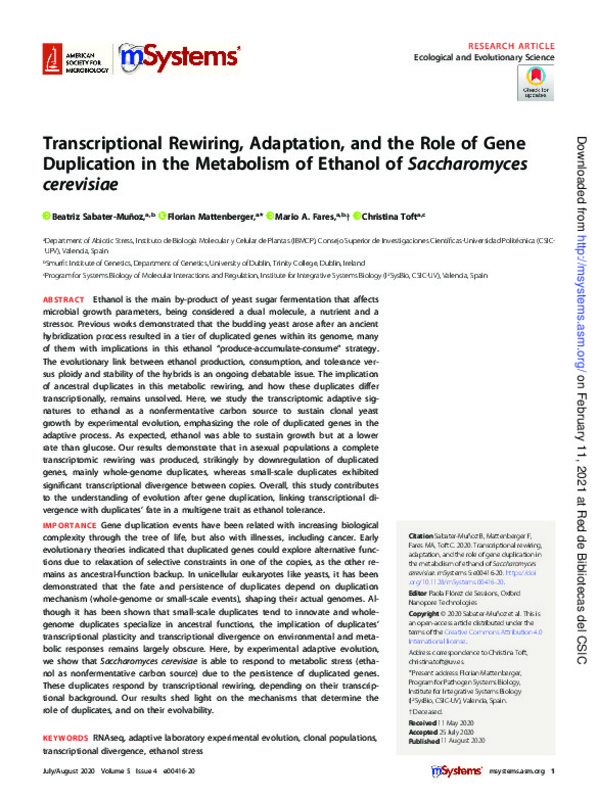JavaScript is disabled for your browser. Some features of this site may not work without it.
Buscar en RiuNet
Listar
Mi cuenta
Estadísticas
Ayuda RiuNet
Admin. UPV
Transcriptional rewiring, adaptation, and the role of gene duplication in the metabolism of ethanol of Saccharomyces cerevisiae
Mostrar el registro sencillo del ítem
Ficheros en el ítem
| dc.contributor.author | Sabater-Muñoz, Beatriz
|
es_ES |
| dc.contributor.author | Mattenberger, Florian
|
es_ES |
| dc.contributor.author | Fares Riaño, Mario Ali
|
es_ES |
| dc.contributor.author | Toft, Christina
|
es_ES |
| dc.date.accessioned | 2021-11-05T14:07:05Z | |
| dc.date.available | 2021-11-05T14:07:05Z | |
| dc.date.issued | 2020-08 | es_ES |
| dc.identifier.uri | http://hdl.handle.net/10251/176270 | |
| dc.description.abstract | [EN] Ethanol is the main by-product of yeast sugar fermentation that affects microbial growth parameters, being considered a dual molecule, a nutrient and a stressor. Previous works demonstrated that the budding yeast arose after an ancient hybridization process resulted in a tier of duplicated genes within its genome, many of them with implications in this ethanol ¿produce-accumulate-consume¿ strategy. The evolutionary link between ethanol production, consumption, and tolerance versus ploidy and stability of the hybrids is an ongoing debatable issue. The implication of ancestral duplicates in this metabolic rewiring, and how these duplicates differ transcriptionally, remains unsolved. Here, we study the transcriptomic adaptive signatures to ethanol as a nonfermentative carbon source to sustain clonal yeast growth by experimental evolution, emphasizing the role of duplicated genes in the adaptive process. As expected, ethanol was able to sustain growth but at a lower rate than glucose. Our results demonstrate that in asexual populations a complete transcriptomic rewiring was produced, strikingly by downregulation of duplicated genes, mainly whole-genome duplicates, whereas small-scale duplicates exhibited significant transcriptional divergence between copies. Overall, this study contributes to the understanding of evolution after gene duplication, linking transcriptional divergence with duplicates¿ fate in a multigene trait as ethanol tolerance. IMPORTANCE Gene duplication events have been related with increasing biological complexity through the tree of life, but also with illnesses, including cancer. Early evolutionary theories indicated that duplicated genes could explore alternative functions due to relaxation of selective constraints in one of the copies, as the other remains as ancestral-function backup. In unicellular eukaryotes like yeasts, it has been demonstrated that the fate and persistence of duplicates depend on duplication mechanism (whole-genome or small-scale events), shaping their actual genomes. Although it has been shown that small-scale duplicates tend to innovate and wholegenome duplicates specialize in ancestral functions, the implication of duplicates¿ transcriptional plasticity and transcriptional divergence on environmental and metabolic responses remains largely obscure. Here, by experimental adaptive evolution, we show that Saccharomyces cerevisiae is able to respond to metabolic stress (ethanol as nonfermentative carbon source) due to the persistence of duplicated genes. These duplicates respond by transcriptional rewiring, depending on their transcriptional background. Our results shed light on the mechanisms that determine the role of duplicates, and on their evolvability. | es_ES |
| dc.description.sponsorship | This work was supported by grants BFU2015-66073-P from the Spanish Ministry of Economy and Competitiveness (MINECO-FEDER) to M.A.F. and SEJI/2018/046 from the Generalitat Valenciana, Programa a la excelencia cientifica de investigadores juniors, to C.T. F.M. was supported by an FPI grant from the Spanish Ministry of Economy and Competitiveness (BES-2016-076677). The funders had no role in study design, data collection and interpretation, or the decision to submit the work for publication. | es_ES |
| dc.language | Inglés | es_ES |
| dc.publisher | American Society for Microbiology | es_ES |
| dc.relation.ispartof | mSystems | es_ES |
| dc.rights | Reconocimiento (by) | es_ES |
| dc.subject | RNAseq | es_ES |
| dc.subject | Adaptive laboratory experimental evolution | es_ES |
| dc.subject | Clonal populations | es_ES |
| dc.subject | Transcriptional divergence | es_ES |
| dc.subject | Ethanol stress | es_ES |
| dc.title | Transcriptional rewiring, adaptation, and the role of gene duplication in the metabolism of ethanol of Saccharomyces cerevisiae | es_ES |
| dc.type | Artículo | es_ES |
| dc.identifier.doi | 10.1128/mSystems.00416-20 | es_ES |
| dc.relation.projectID | info:eu-repo/grantAgreement/GVA//SEJI%2F2018%2F046/ | es_ES |
| dc.relation.projectID | info:eu-repo/grantAgreement/MINECO//BFU2015-66073-P//CARACTERIZANDO LOS MECANISMOS DE INNOVACION POR DUPLICACION GENICA/ | es_ES |
| dc.relation.projectID | info:eu-repo/grantAgreement/MINECO//BES-2016-076677/ | es_ES |
| dc.rights.accessRights | Abierto | es_ES |
| dc.contributor.affiliation | Universitat Politècnica de València. Instituto Universitario Mixto de Biología Molecular y Celular de Plantas - Institut Universitari Mixt de Biologia Molecular i Cel·lular de Plantes | es_ES |
| dc.description.bibliographicCitation | Sabater-Muñoz, B.; Mattenberger, F.; Fares Riaño, MA.; Toft, C. (2020). Transcriptional rewiring, adaptation, and the role of gene duplication in the metabolism of ethanol of Saccharomyces cerevisiae. mSystems. 5(4):1-15. https://doi.org/10.1128/mSystems.00416-20 | es_ES |
| dc.description.accrualMethod | S | es_ES |
| dc.relation.publisherversion | https://doi.org/10.1128/mSystems.00416-20 | es_ES |
| dc.description.upvformatpinicio | 1 | es_ES |
| dc.description.upvformatpfin | 15 | es_ES |
| dc.type.version | info:eu-repo/semantics/publishedVersion | es_ES |
| dc.description.volume | 5 | es_ES |
| dc.description.issue | 4 | es_ES |
| dc.identifier.eissn | 2379-5077 | es_ES |
| dc.identifier.pmid | 32788405 | es_ES |
| dc.identifier.pmcid | PMC7426151 | es_ES |
| dc.relation.pasarela | S\432753 | es_ES |
| dc.contributor.funder | Generalitat Valenciana | es_ES |
| dc.contributor.funder | European Regional Development Fund | es_ES |
| dc.contributor.funder | Ministerio de Economía y Competitividad | es_ES |








